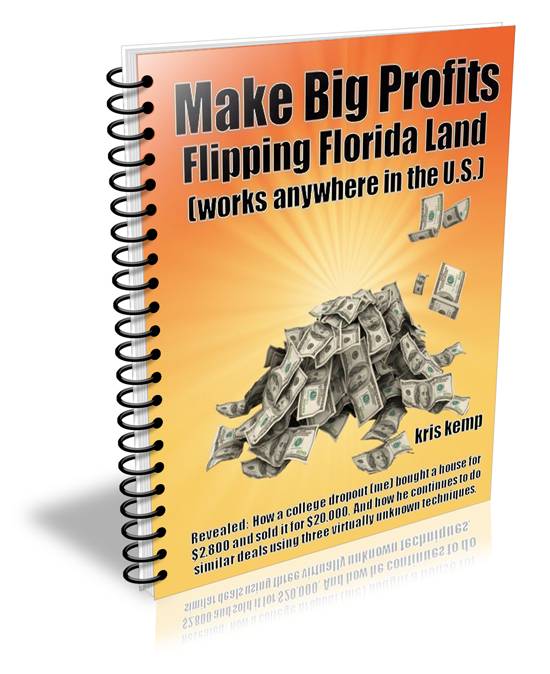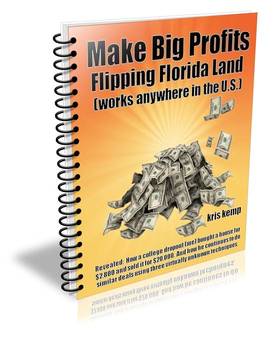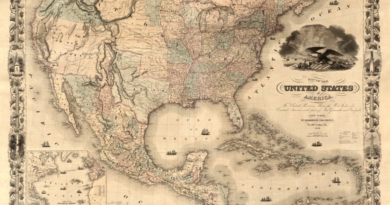Make Big Profits Flipping Tax Deed Properties: 20 Steps anyone can follow to get started
Introduction
If you’ve been seduced by the easy promises of wealth by the house flipping shows that proliferate HD TV and other networks, then tried house flipping only to fail miserably, then you might want to keep reading.
f you’ve tried Real Estate investing and failed, you’re not alone. In fact, you’re probably in the majority. Conventional Real Estate investing is often very expensive and very competitive. What I’m about to share with you is a less risky, less competitive way to earn profits with real estate.

Hi, my name’s Kris Kemp. Over the years, I’ve been doing a bit of real estate investing. I focus on tax deed sales–properties (land, houses, mobile homes) wherein the property owner is delinquent (late) on his taxes, so much so that the property reverts to the county and is then sold at an auction, usually at the courthouse. I’ve even written an ebook, Make Big Profits Flipping Florida Land, about this topic. What you’re about to read is excerpted from this ebook.
+ + + + + + + + + + + + + + + + + + + + + + + +
Curious to learn more about Real Estate investing for fun and profit? Discover the simple, powerful, effective strategies you can put into motion to find, buy, and flip properties—land, houses, mobile homes—for fun and profit in Florida or anywhere else in the U.S. I’ve written a few ebooks about this topic and I think you’ll find them highly entertaining and informative, too. Click the links below to find out more:

Ebook Bundle for RE Investors + 2 Entries for your Chance to Win a Florida Camping Lot
http://www.thelanddepot.net/ebook-bundle/
+ + + + + + + + + + + + + + + + + + + + + + + +
Tax Deed Sales
Once I discovered tax deed sales, and learned how to make money with tax deed sales, I felt as if I had discovered gold in a mine that everyone else was ignoring. When I explained it to people, they usually replied with “that sounds too complicated”.
The thing is, it’s not complicated. It’s just a matter of following steps and having a system, finding what works, then repeating that, while continuing to learn from others.
Success leaves clues. If you want to be successful, find other people who have been successful and then follow what they do, follow the clues.
Here are 20 steps to buying tax deed properties, so you can make your money work for you and even get checks to your bank account every month!

20 steps to buying tax deed properties
There are a few steps to buying and selling tax deeds, and they are not hard. First, let me caution you. When you tell someone that you intend to spend a few thousand dollars on a tax deed, he might respond with a groan or “What if it has liens (debts) on it”, or “there’s a reason why it’s at a tax deed sale.” That’s understandable, because they don’t know how tax deed sales work, so they assume the element of risk outweighs the potential for profit. (My experience has been that it does not.)
Perhaps they cling to the idea that you’ve got to be like them and work at a job you don’t like for a small amount of money. Let them be. They’re probably happy in their routine as that’s the only thing they know. They’re in a familiar flight pattern and they’re comfortable with it. Even if they are going in circles, they know what to expect. Perhaps you can buy a tax deed, resell it for a profit, and share your story with them to help them see that they have options. Maybe you can offer to use their $2,000 to buy a tax deed property, and offer to repay them the entire amount unless you can make a substantial profit within 30-days. Offer to do this for free. See what happens.
Are you excited, yet? With $500 dollars, you can own land in Florida. You can hold it while it appreciates in value, or you can sell it for an immediate profit. If you don’t have $500 dollars, you probably know someone who does. You could offer to find them bargain land for a small donation, a gift, to you.
With that in mind, here’s the specific steps to follow to buy and sell tax deed properties.
1) Select a state. Then, select a county within that state.
Search online for “(name of county), (state) clerk’s website”, and “(name of county), (state) property appraiser’s website”.
2) Visit county clerk’s website.
Find the link for “tax deed sales.” Click it.
3) Look at the tax deed sales page.
Usually, it will list the parcel identification number, also called the parcel control number, the opening bid, and the tax certificate number. The parcel identification number (PIN) is made up of a series of numbers that represents the location of the property on a Platt Map. For more information on learning how to use PINs. Search online, using DuckDuckGo.com for “understanding parcel identification numbers”. Or, if you have my ebook, Make Big Profits Flipping Florida Land, find the chapter “Understanding Parcel Identification Numbers”.

5) Print the tax deed sales page.
Or, save it as a PDF to your phone, tablet, laptop, computer. Email this to yourself. Text it to yourself. Make multiple copies.
6) Visit the property appraiser’s website.
To do this, search for “(name of county), (state) property appraiser’s website)”
7) Go to “search records”
Usually, you’ll have the option to search using the parcel identification number or the name of the owner. Usually, the name of the owner is required to be typed in last name first, first name last. After you type in the parcel identification number, click on the “search” option, or hit “enter” or “return” on you keyboard.
8) Examine property information
At the new page, you’ll see information on the property, including the size of the lot, the use codes, the property taxes, and the last sales date. Make a note of the size of the lot, the last sale date and the price it sold for, and the land use code. If the land use code is a number, you can usually click it to see its land use, whether it’s vacant residential, commercial, agricultural, a combination of these or something else. Print this page.
9) Visit GIS
The upper right hand side of the new page will give you a GIS (Graphical Information System) map. Click it.
10) Examining aerial view
A new page will appear, giving you an aerial view of the property, and a list, usually to the right, with useful information (last sales date, sales price, owner information, market value). Print this page.
11) Call the property appraiser and ask questions about the lot.
Their contact information is at their website, usually the first page.
Ask them if the property is buildable, if it’s near a school, an airport, a hospital, a river, a body of water. Ask them if any major infrastructure–highways, shopping centers, theme parks–is being planned nearby.
12) Find out what’s going on with roads & development
Find the (state) (county) Department of Transportation website. Find out if any highways or off-ramps are planned in the vicinity of the property. Find out everything you can about the lot. If possible, visit the lot, by calling the property appraiser and asking for directions.
When you visit the lot, bring a notebook and pen and smart phone to take pictures and videos. Walk the entire property. Take notes.

13) Ask questions
Ask these questions:
Is trash being dumped here?
Are there low areas that flood, indicated by standing water or areas of dampness in spite of little rainfall?
Does it appear to have a septic or well?
Is power (electric pole) and phone (telephone pole) nearby?
14) Talk to the neighbors
Another way to find out information about the property is to talk to the neighbors.
Talk to the neighbors or people who live nearby or in the community. Ask them if there is crime in the area.
Ask about the area. Find out as much as you can.
15) Research the job market
Is this an area where a lot of people are moving to because of the robust job market? Is this a growing area?
16) Call the tax clerk and ask questions about the tax deed sale rules.
Their contact information is at their website, usually the first page.
1. Ask them what time the sale is.
2. Confirm that the sale is still happening on that date.
3. Ask them where the sale is held.
4. Ask them what the procedures are.
At most tax sales I have attended, one must sign up in order to bid. Then, that person is given a number.
Once the bids start, you say your price and hold up your number. That way, they know your name.
If you’re the winning bidder, you have to pay a $200 cash deposit right then and there. Once the sale ends, you have to pay the balance (the winning bid minus the $200 deposit) by 4pm that afternoon or by 1pm the following day. This varies according to county, so please find this out in advance. Usually, you can pay the balance within 24 hours.
But some counties require that the balance is paid sometime later that afternoon. Call ahead. Find out. If you do not pay the balance, you will lose the $200 deposit and, in many cases, you lose the right to bid on future properties at tax deed sales.

17) Attend the sale
At most of the sales that I’ve attended, people dress casually–wearing denim jeans and collar shirts. It’s rare to see someone in a suit, unless they’re a lawyer representing a buyer. Before you attend the sale, remember to bring your money (cashier’s check, money order, cash), your notes on the tax deed lands for sale, and anything else you need. It’s a good idea to keep a list and, before you leave, cross everything off to make sure you don’t forget anything.
As soon as you arrive at the courthouse, visit the county clerk’s office and ask if any of the tax deed lands have been redeemed (bought back by the original owner). If this is the case, cross them off your list. If this happens to the lot that you were hoping to win, look over the other lots and determine what would fit your needs, what you can afford, and what would bring you the most profit.
Are tax deed sales crowded? Sometimes. Call the tax clerk and ask them if they expect a crowd. If you attend a tax deed sale that is crowded, research another county and attend their sale. Eventually, you’ll find one that has less competition. The bottom line is that it’s land and everyone, for the most part, wants to own land in Florida. Eventually, you will determine the best counties for which to attend tax deed sales–those counties that offer lots of properties for bid with a small number of people attending the sale.
18) Figuring out the competition
At some tax deed sales you will see a lot of people. At some tax deed sales, you will see 4 to 10 people. These are the ones you want to attend. At the bigger tax deed sales, the bidding is usually competitive. At tax deed sales that are less well attended, you can arrive early, talk to the other bidders, find out what they want, and agree not to bid on the properties that they want. (I have done this on several occasions at tax deed sales. Usually, these are small towns where the bidders know each other. Even if you’re an outsider, greet someone, introduce yourself and ask them if it’s going to get crowded. After they respond, ask: “So what properties are you trying to get?” You’ll be surprised how friendly people are if you extend the friendship first.)

19) Once the tax deed sale starts
After the tax deed sale starts, pay attention to the clerk’s legal description of the property. Know what you are bidding on. Keep calm. Even at crowded sales, you’ll find that a handful of people bid past a certain money amount. Sometimes, as soon as they leave, everyone starts bidding as the highest bid amount as been reduced drastically due to the high rollers leaving.

20) Attend sales in different counties
If you experience a large crowd at your first tax deed sale, and the bids are run up to prices higher than you can afford, do not get discouraged.
Consider this a learning experience. In that way, make it useful.
What did you learn? You learned that you might want to attend a sale in a different county, where there are more tax deed lands available for auction.
That’s what I try to do, even if the county is hours away. If I can find a tax deed auction that has 50 lots, with all the lost starting at near $1,200, I will try to attend that sale. Even if it is crowded, the higher number of lots makes the odds in your favor.
I met someone at a tax deed sale who visited 15 different counties in Florida. She has 500 lots. She began doing this in 1997, starting with $34,000, and she now has 5 million dollars in equity.


Overview
As an overview, these are the steps to buying and selling land using the Florida Counties Tax Deed Sales Map.
1) Visit the Florida counties map 2) Pick a county or a few
2) Pick a county or a few
3) Visit the websites, both the property appraisers and clerk of court
4) Determine the date and times of upcoming sales
5) Research the sales
6) Attend the sales and bid on a property
If it’s competitive, you can also research the GIS (Graphical Information System) map link, located the property appraiser’s website, and look for out- of-state owners who might be tired of paying property taxes. Send them a letter offering to buy their lot.
If you send 50 letters, you might get 1-3 responses. But those responses might yield you a profit of a few thousand dollars, enough to get started doing this part-time. Keep at it. Eventually, you might be able to do it full- time.
If you don’t want to write a letter to a property owner, get their contact information and go to: www.whitepages.com Once there, do a reverse search, typing in their information and searching for their phone number. Call them, evenings are best, and politely introduce yourself and ask them if they’re interested in selling their property.
FlipFloridaLand.com FindingFloridaLand.com TheLandDepot.net

What if there’s more than one tax deed sales on the same day?
If you find that there are two tax deed sales on the same day, in two different counties, which one should you attend?
Call the county clerks for both counties and ask them if they expect the sale to be crowded.
Ask them if the sale has been cancelled.
Ask them if any of the properties have been redeemed (paid off, so the property is no longer up for auction). Prior to the sale, find out as much as you can. Then, make a decision.
If one of the counties is closer, but has only ten properties for sale, and the other county is much further away, but has 50 properties for sale, I would pick the county with more properties.
Although buying tax deeds presents enormous opportunity to purchase land at a low cost, it requires competitive bidding which can, sometimes, drive the price beyond what you’re willing to pay. If that happens, hold your money. You’re likely to find even better opportunities in the near future.
+ + + + + + + + + + + + + + + + + + + + + + + +

Curious to learn more about Real Estate investing for fun and profit? Discover the simple, powerful, effective strategies you can put into motion to find, buy, and flip properties—land, houses, mobile homes—for fun and profit in Florida or anywhere else in the U.S. I’ve written a few ebooks about this topic and I think you’ll find them highly entertaining and informative, too. Click the links below to find out more:

Ebook Bundle for RE Investors + 2 Entries for your Chance to Win a Florida Camping Lot
http://www.thelanddepot.net/ebook-bundle/

Discover how to find, buy, and flip properties—land, houses, mobile homes—in Florida or anywhere else in the U.S. for fun and profit! If a college dropout (me) can do it, so can you!
www.MakeBigProfitsFlippingFloridaLand.com

Revealed: How a college dropout bought a house for $2,000 and sold it for $20,000.
TheLandDepot.net
FlipFloridaLand.com
MakeBigProfitsFlippingFloridaLand.com

Kris Kemp is a writer, copywriter, musician, traveler, creative entrepreneur and the author of 20+ ebooks. He specializes in copywriting for sales pages, landing pages, squeeze pages, and email marketing campaigns. He has a variety of interests that share the common theme of freedom–health freedom, time freedom, financial freedom, location/travel freedom.
(Feel free to republish this article, as long as you leave the links in place.)
© Kris Kemp, 2020 & beyond







